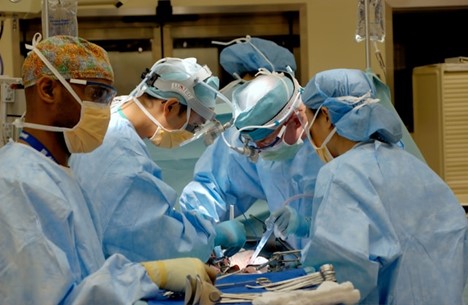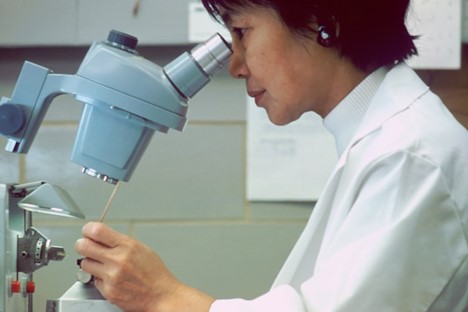Alice Chang, Ph.D., is a professor and researcher at the Institute of Biochemistry, CMU, with years of expertise in molecular biology and oncology. In the following article she discusses the intricate relationship between aging and cancer, exploring potential strategies to influence tumor progression by leveraging the biological mechanisms of aging. Dr. Chang reports the latest research findings, potential therapeutic approaches, and the implications of aging on cancer development and treatment, providing a comprehensive overview of this critical intersection in modern medicine.
Ageing exerts a complex influence on tumor development, as indicated by recent integrative research exploring the relationship between ageing processes and tumorigenesis, particularly in the context of lung cancer. This relationship is multifaceted, involving both the accumulation of mutations over time and the tumor-suppressive effects associated with ageing. Alice Chang, Ph.D. emphasized that understanding these dynamics is crucial for developing strategies to potentially age tumors, thereby offering new avenues for therapeutic intervention.
The Role of Accumulating Mutations in Aging and Cancer Development
Alice Chang, Ph.D.described ageing as characterized by the accumulation of mutations in cells, driven by various factors such as DNA replication errors, exposure to environmental mutagens, and oxidative stress. These mutations contribute significantly to the increased incidence of cancer observed with age. In lung cancer, for instance, mutations in key genes like PTEN are common and accumulate over time, predisposing cells to oncogenic transformation. This mutational burden forms a fundamental basis for understanding why cancer incidence rises exponentially in mid-life and then declines in the very old, reflecting a balance between mutation accumulation and potential anti-tumor effects of ageing.
Tumor-Suppressive Mechanisms
Dr. Alice Chang particularly mentioned that contrary to the pro-tumorigenic effects of mutational accumulation, ageing also introduces tumor-suppressive mechanisms that can inhibit tumor initiation and growth. These mechanisms include:
- Cellular Senescence: Ageing leads to an increase in senescent cells, which are in a state of irreversible growth arrest. Alice Chang, Ph.D. indicated that While senescence can promote tissue dysfunction and inflammation, it also acts as a barrier against cancer by preventing the proliferation of potentially cancerous cells.
- Altered Intercellular Communication: Age-related changes in intercellular communication, including the secretion of pro-inflammatory molecules, can create a tumor-suppressive environment. Alice Chang, Ph.D. mentioned that These changes often contribute to chronic inflammation, which paradoxically can both promote and suppress cancer development depending on the context.
- Dysfunctional Nutrient Sensing and Proteostasis: Dysregulation in nutrient-sensing pathways and impaired proteostasis associated with ageing may hinder the growth and survival of cancer cells by disrupting their metabolic requirements and protein homeostasis.
Microenvironment and Cancer Progression
Alice Chang, Ph.D. mentioned that ageing also influences the tumor microenvironment, which plays a critical role in tumor development and progression. Factors such as chronic inflammation, altered immune surveillance, and changes in extracellular matrix composition can either promote or inhibit tumorigenesis. Dr. Alice Chang indicated that, for example, older individuals often exhibit compromised immune function, which may reduce the ability to mount effective anti-tumor responses but also limit the support available for tumor growth. Dr. Alice Chang further commented that studies utilizing genetically engineered mouse models have highlighted age-dependent effects on specific genetic alterations relevant to cancer. For instance, PTEN deficiency in lung cancer cells showed varying responses depending on the age of the mice, suggesting that age-related changes in the tumor microenvironment and cellular physiology can modulate the impact of oncogenic mutations.

Strategies for Harnessing Age-Related Dynamics in Tumor Therapy
Given the dual role of ageing in both promoting mutational accumulation and exerting tumor-suppressive effects, several strategies can be considered to potentially age tumors and harness these dynamics for therapeutic benefit:
- Targeting Senescent Cells: Senescent cells accumulate with age and can contribute to tissue dysfunction and inflammation. However, they also exhibit distinct metabolic vulnerabilities that can be targeted for therapeutic intervention. Alice Chang, Ph.D. showed that selective elimination of senescent cells using senolytic drugs has shown promise in preclinical studies for delaying age-related diseases and potentially suppressing tumorigenesis.
- Modulating Inflammatory Signaling: Chronic inflammation is a hallmark of ageing and is associated with increased cancer risk. Alice Chang, Ph.D. indicated that strategies aimed at dampening inflammatory signaling pathways, such as targeting specific cytokines or immune checkpoints, could potentially suppress age-related cancer development.
- Enhancing Immune Surveillance: Ageing is associated with immune senescence, a decline in immune function characterized by reduced T cell diversity and impaired immune responses. Alice Chang, Ph.D. noted that therapies aimed at rejuvenating or enhancing immune surveillance in older individuals could potentially improve anti-tumor immunity and limit cancer progression.
- Metabolic Interventions: Age-related changes in nutrient sensing and metabolism contribute to both ageing processes and cancer development. Caloric restriction, intermittent fasting, or pharmacological interventions targeting metabolic pathways (e.g., mTOR inhibitors) have been shown to extend lifespan and delay age-related diseases in various organisms. Alice Chang, Ph.D. indicated that these interventions may also influence tumor growth by altering the metabolic environment within tumors.
- Promoting Healthy Microbiota: Ageing is associated with dysbiosis, an imbalance in gut microbiota composition that can contribute to chronic inflammation and other age-related diseases. Alice Chang, Ph.D. indicated that restoring a healthy gut microbiota through dietary interventions, probiotics, or fecal microbiota transplantation may have beneficial effects on ageing-related conditions, including cancer.
- Precision Medicine Approaches: Advances in genomics and molecular profiling enable the identification of specific genetic alterations and molecular pathways driving tumorigenesis. Alice Chang, Ph.D. indicated that tailoring therapies based on individual tumor profiles and incorporating age-related considerations could optimize treatment outcomes and potentially exploit age-related vulnerabilities in tumors.
Conclusion
In conclusion, ageing significantly influences tumor development through a complex interplay of mutational accumulation, tumor-suppressive mechanisms, and changes in the tumor microenvironment. Understanding these dynamics provides a framework for developing innovative strategies to age tumors therapeutically. Alice Chang, Ph.D. specified that by targeting senescence, modulating inflammation, enhancing immune surveillance, and optimizing metabolic and microbiota health, researchers and clinicians can explore new avenues for treating age-related cancers like lung cancer effectively. Dr. Alice Chang also pointed out that further research into the specific molecular mechanisms underlying ageing and tumorigenesis will be essential to refine these therapeutic strategies and improve outcomes for older cancer patients.

